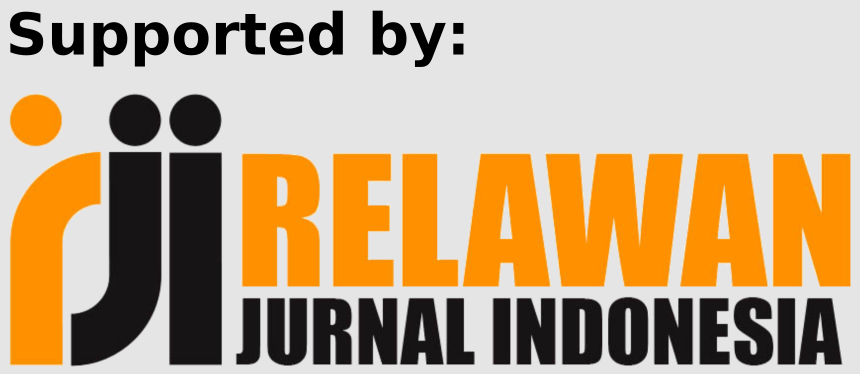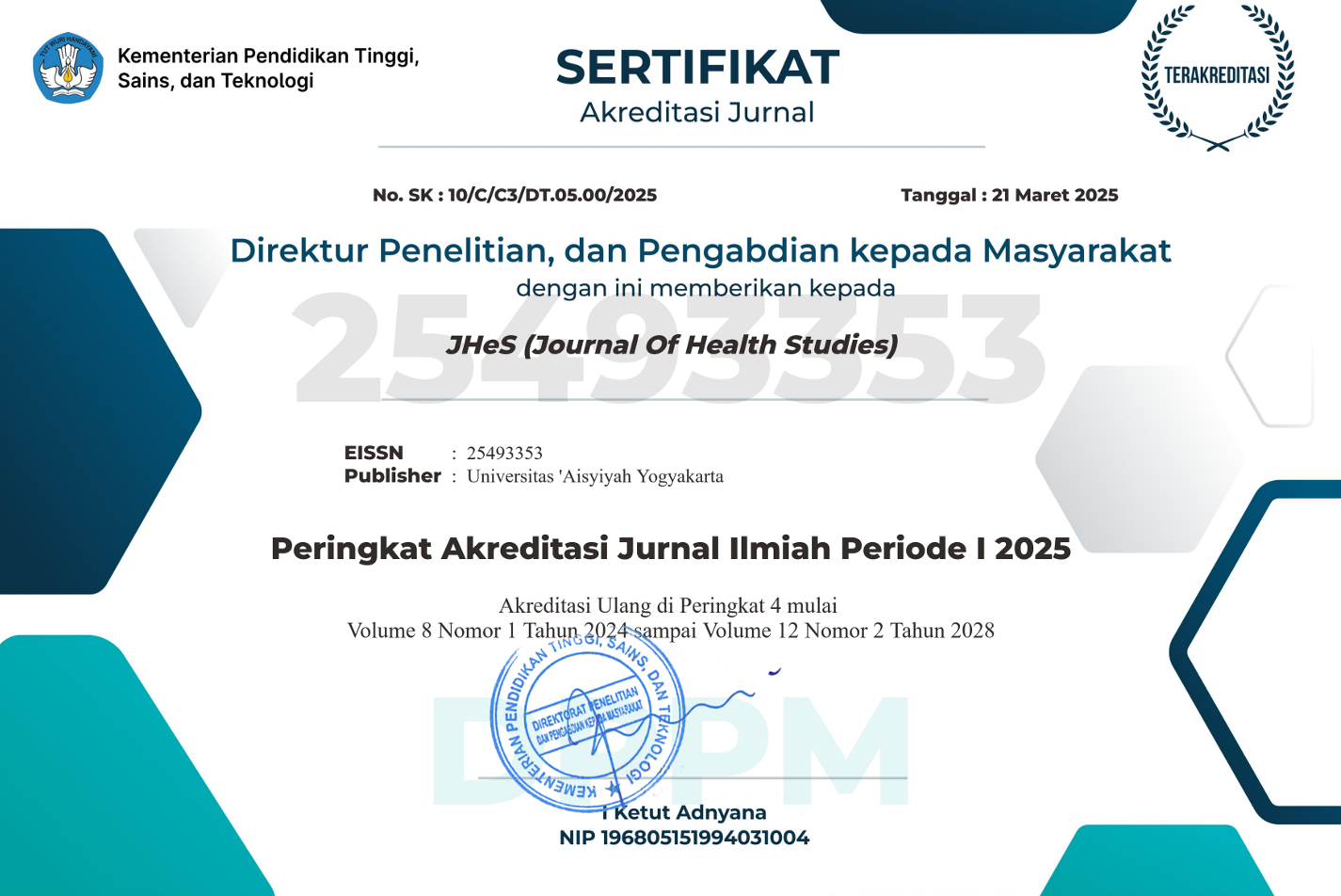Model spiritual care with an adaptation theory approach Callista Roy on cortisol levels
DOI:
https://doi.org/10.31101/jhes.4283Abstract views 221 times
Keywords:
cortisol levels, ischemic stroke, spiritual care modelAbstract
Downloads
References
Afshar, M., Sadat, Z., & Bagheri, M. (2021). The Effect of Spiritual Counseling on Hope in Patients with Multiple Sclerosis: A Randomized Clinical Trial. International Journal of Community Based Nursing and Midwifery, 9(4), 319–322. https://doi.org/10.30476/ijcbnm.2021.88605.1523
AHA, A. H. A. (2019). 2019 Stroke Fact Sheet (pp. 1–4). American Heart Association. https://www.stroke.org/en/about-stroke
Alligood, M. R. (2017). Pakar Teori Keperawatan dan Karya Mereka (A. Y. S.Hamid & K. Ibrahim (eds.); 8th ed.). Elsevier Ltd.
Amalia, L. (2024). The Relationship of Cortisol Levels and Sleep Quality in Acute Ischemic Stroke Patients : A Literature Review. Jurnal Neuroanestesi Indonesia, 13(1), 46–52. https://doi.org/https://doi.org/10.24244/jni.v13i1.533
Amini, K., Tahrekhani, M., Abbas-alamdari, Z., & Faghihzadeh, S. (2020). The Effect of Spiritual Care on Anxiety about Death in Patients with Gastrointestinal Cancer Undergoing Chemotherapy : A Randomized Controlled Trial. European Journal of Integrative Medicine, 36, 1–6. https://doi.org/10.1016/j.eujim.2020.101117
Anderson, S. C. (2019). The global burden of stroke: persistent and disabling. The Lancet Neurology, 18, 439. https://doi.org/10.1016/S1474-4422(19)30030-4
Deepradit, S., Powwattana, A., Lagampan, S., & Thiangtham, W. (2023). Effectiveness Of A Family-Based Program For Post-Stroke Patients And Families: A Cluster Randomized Controlled Trial. International Journal of Nursing Sciences, 10(4), 446–455. https://doi.org/10.1016/j.ijnss.2023.09.020
Dianti, M. R., & Indrawijaya, Y. Y. A. (2021). Efektifitas Terapi Murottal Al Qur’an terhadap Stres Mencit (Mus Musculus). J. Islamic Pharm, 6(1), 28–34.
Gandana, R. S., & Kariasa, I. M. (2017). Physical Disability and Self-Concept of Stroke Patients in The Budhi Asih Hospital , Indonesia. UI Proc. Health Med, 3, 47–49. https://doi.org/10.7454/UIPHM.V3I1.192
Ghorbani, M., Mohammadi, E., Aghabozorgi, R., & Ramezani, M. (2020). The Effect of Applying Spiritual Care Model on Well-Being and Quality of Care in Cancer Patients. Supportive Care in Cancer, 29(5), 2749–2760. https://doi.org/10.1007/s00520-020-05781-7
Góes, M. G. O. de, & Crossetti, M. da G. de O. (2020). Developing a Spiritual Care Model for Patients and Their Relatives in Illness. Rev Gaúcha Enferm, 41, 1–10. https://doi.org/https://doi.org/10.1590/1983-1447.2020.20190150
Gulyaeva, N. V., Onufriev, M. V., & Moiseeva, Y. V. (2021). Ischemic Stroke, Glucocorticoids, and Remote Hippocampal Damage: A Translational Outlook and Implications for Modeling. Frontiers in Neuroscience, 15(December), 1–10. https://doi.org/10.3389/fnins.2021.781964
Haghparast, A., Tabatabaei, H. S., Ghanbari, N., & Maleki, L. (2021). The Effect of the Spiritual Care Model Based on the Righteous Heart on the Post-Traumatic Stress of Veterans in 2019. Teikyo Medical Journal, 44(02), 859–867.
Kageyama, K., Iwasaki, Y., & Daimon, M. (2021). Hypothalamic Regulation Of Corticotropin-Releasing Factor Under Stress And Stress Resilience. International Journal of Molecular Sciences, 22(22). https://doi.org/10.3390/ijms222212242
Kaur, S., & Singh, R. (2017). Role of Different Neurotransmitters in Anxiety : A Systematic Review. International Journal of Pharmaceutical Sciences and Research, 8(2), 411–421. https://doi.org/10.13040/IJPSR.0975-8232.8(2).411-21
Khalajinia, Z., Tehran, H. A., & Heidari, A. (2021). Explaining The Perception of Spiritual Care from The Perspective of Health Personnel: A Qualitative Study. Journal of Education and Health Promotion |, 10(53), 1–6. https://doi.org/10.4103/jehp.jehp_599_20
Lattanzi, S., Divani, A. A., & Coccia, M. (2023). Social Functioning can Improve Motor Recovery after Stroke. Journal of Integrative Neuroscience, 22(2), 1–2. https://doi.org/10.31083/j.jin2202032
Liu, W., Liu, X., Wang, J., Peng, S., Li, J., Pei, M., Qiu, Z., & Zhang, P. (2023). Predicting The Relationship Between Anxiety And Health-Related Quality Of Life In Post-Stroke Patients: The Role Of Sleep Duration. Journal of Stroke and Cerebrovascular Diseases, 32(11), 107368. https://doi.org/10.1016/j.jstrokecerebrovasdis.2023.107368
Lupien, S. J., Ouellet-Morin, I., Trépanier, L., Juster, R. P., Marin, M. F., Francois, N., Sindi, S., Wan, N., Findlay, H., Durand, N., Cooper, L., Schramek, T., Andrews, J., Corbo, V., Dedovic, K., Lai, B., & Plusquellec, P. (2023). The Destress for Success Program: Effects of a stress education program on cortisol levels and depressive symptomatology in adolescents making the transition to high school. Neuroscience, 249, 74–87. https://doi.org/10.1016/j.neuroscience.2013.01.057
Moffat, S. D., An, Y., Resnick, S. M., Diamond, M. P., & Ferrucci, L. (2020). Longitudinal change in cortisol levels across the adult life span. Journals of Gerontology - Series A Biological Sciences and Medical Sciences, 75(2), 394–400. https://doi.org/10.1093/gerona/gly279
Neidert, S., Katan, M., Schuetz, P., Fluri, F., Ernst, A., Bingisser, R., Kappos, L., Engelter, S. T., Steck, A., Müller, B., & Christ-Crain, M. (2018). Anterior pituitary axis hormones and outcome in acute ischaemic stroke. Journal of Internal Medicine, 1(4), 420–432. https://doi.org/10.1111/j.1365-2796.2010.02327.x
Qinthara, F. N., & Hanami, Y. (2024). Adaptation of Religious/Spiritually Integrated Practice Assessment Scale-Client Attitude (RSIPAS-CA) in Indonesia. Jurnal Psikologi Islam Dan Budaya, 7(1), 23–32. https://doi.org/10.15575/jpib.v7i1.29083
Roelfsema, F., Van Heemst, D., Iranmanesh, A., Takahashi, P., Yang, R., & Veldhuis, J. D. (2017). Impact of age, sex and body mass index on cortisol secretion in 143 healthy adults. Endocrine Connections, 6(7), 500–509. https://doi.org/10.1530/EC-17-0160
Rosyadi, I., Kusbaryanto, & Yuniarti, F. A. (2019). Literatur Review Aspek Spiritualitas / Religiusitas Dan Perawatan Berbasis Spiritual / Religius Pada pasien kanker. Jurnal Kesehatan Karya Husada, 7(1), 117–120. http://jurnal.akeskhjogja.ac.id/index.php/jkkh/article/download/262/164
Salamizadeh, A., Mirzaei, T., & Ravari, A. (2017). The Impact of Spiritual Care Education on the Self-Efficacy of the Family Caregivers of Elderly People with Alzheimer ’ s Disease Original A rticle. Int J Community Based Nurs Midwifery, 5(3), 231–238. https://pdfs.semanticscholar.org/d75b/106243afc2e45d43b492a6a332ddbee171c8.pdf
Teo, C. H., Wong, A. C. H., Sivakumaran, R. N., Parhar, I., & Soga, T. (2023). Gender Differences in Cortisol and Cortisol Receptors in Depression: A Narrative Review. International Journal of Molecular Sciences, 24(8), 1–13. https://doi.org/10.3390/ijms24087129
Tumeleng, P., Runtuwene, T., & Kembuan, M. (2015). Sebaran Kebiasaan Merokok Pada Pasien Stroke Iskemik Yang Di Rawat Inap Di Bagian Neurologi Rsu Prof. Dr. R. D. Kandou Manado. E-CliniC, 3(1), 262–266. https://doi.org/10.35790/ecl.3.1.2015.6827
Utami, T. N. (2017). Tinjauan Literatur Mekanisme Dzikir Terhadap Kesehatan: Respons Imunitas. Jurnal JUMANTIK, 2(1), 106–109. http://jurnal.uinsu.ac.id/index.php/kesmas/article/view/965
Vanessa and Susan. (2016). Parent Cortisol and Family Relatedness Predict Anxious Behavior in Emerging Adults. Physiology & Behavior, 30(7), 802–811. https://doi.org/10.1177/0022146515594631.Marriage
Wijayanti, L., Haryanto, J., & Suharto. (2017). The Effects of Spiritual Care on Depression and Meaning in Life in the Clients with Kidney Failure Receiving Hemodialysis in Rumah Sakit Islam Surabaya. International Journal of Science and Research (IJSR), 6(7), 247–251. https://doi.org/10.21275/art20174828
Yilmaz, C. K., & Kara, F. Ş. (2020). The Effect of Spiritual Well-Being on Adaptation to Chronic Illness Among People with Chronic Illnesses. Perspectives in Psychiatric Care, 1–8. https://doi.org/10.1111/ppc.12566
Yu, Y., Liu, L., Huang, J., Shen, G., Chen, C., Huang, Y., Zhang, B., Tang, S., & Feng, Y. (2020). Association Between Systolic Blood Pressure And First Ischemic Stroke In The Chinese Older Hypertensive Population. Journal of International Medical Research, 48(4), 1–12. https://doi.org/10.1177/0300060520920091
Yuliadi, I. (2021). HPA Aksis Dan Gangguan Psikosomatik. Jurnal Ilmiah Psikologi Candrajiwa, 6(1), 1–22. https://candrajiwa.psikologi.fk.uns.ac.id/
Zorn, J. V., Schür, R. R., Boks, M. P., Kahn, R. S., Joëls, M., & Vinkers, C. H. (2017). Cortisol stress reactivity across psychiatric disorders: A systematic review and meta-analysis. Psychoneuroendocrinology, 77, 25–36. https://doi.org/10.1016/j.psyneuen.2016.11.036
Downloads
Published
Issue
Section
License
Copyright (c) 2025 JHeS (Journal of Health Studies)

This work is licensed under a Creative Commons Attribution-ShareAlike 4.0 International License.
With the receipt of the article by the Journal of Health Studies Editorial Board and the decision to be published, then the copyright regarding the article will be diverted to Journal of Health Studies. Universitas 'Aisyiyah Yogyakarta as the publisher of Journal of Health Studies hold the copyright regarding all the published articles in this journal.
Journal of Health Studies is licensed under a Creative Commons Attribution-ShareAlike 4.0 International License.













